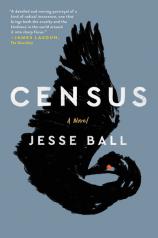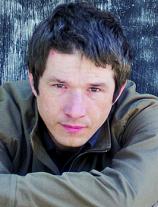Census
Review
Census
At the opening of his new novel, CENSUS, Jesse Ball includes an author’s note that immediately raises the stakes of the narrative that follows. He dedicates the book to his older brother Adam, who, he recounts, had Down syndrome and died in his mid-20s. Ball writes of his tangled memories of his brother, and of his childhood conviction that he would some day be responsible for his older brother, even though the burden of that responsibility never truly came to fruition. Continuing to imagine that now-impossible future, Ball writes, was the genesis of CENSUS.
The book’s unnamed narrator is an older man, a widower and successful surgeon whose professional colleague breaks the news that he has a terminal heart condition. Knowing that his time is finite, the narrator quits his job and instead signs on as a census taker, driving north with his developmentally disabled son through a series of towns named after letters and arranged alphabetically. When he reaches Z, the narrator knows his life will be over, and he has arranged for his son to travel back south, to be cared for by a family friend now that both of his parents are deceased.
"...an elegiac yet ultimately hopeful story about a man’s intentions for his final days and about his wishes and dreams for his son following his death."
The towns and landscapes through which the narrator and his son drive in their aged car are dramatic and, at times, hostile. One town boasts a huge rope factory whose workers suffer multiple serious accidents --- sometimes fatal --- daily. Another has been shuttered following a mine disaster. Between towns are marshes and mountains, forests and fields --- strange and sparsely populated territory studded with these small and sometimes unfriendly settlements.
The census itself bears little resemblance to the standard questionnaires with which we might be familiar. Its purpose is unclear, and the census taker is required to tattoo or brand every inhabitant as a way of marking their participation, their very existence. Some, as you might imagine, are fearful or reluctant, while others greet the narrator and his son with hospitality.
As for the census taker, he views his new profession as an opportunity to practice the kind of awareness and observation that was a hallmark of his late wife’s personality. She was a performance artist, an unconventional kind of clown, trained at an equally unconventional school --- and upon the birth of their unconventional son, she made it her life’s work to make his life as bearable, as meaningful, even as joyful as possible. “I here and now give you permission to live an examined life,” the census trainer tells the narrator about the importance of the work he undertakes, “beginning now with this moment in which I ask you a question and you, poor soul, may examine your life in the light that it sheds.”
CENSUS is a book that resists easy categorization. Its dramatic design and modern, sparse layout seem, at times, at odds with the almost fable- or fairy tale-like quality of its prose. But, in the end, the novel transcends both, becoming an elegiac yet ultimately hopeful story about a man’s intentions for his final days and about his wishes and dreams for his son following his death. The son’s limitations, the cruelties with which the world has at times pummeled him, make this narrative even more poignant than it would be otherwise. But even though these particulars (heightened by Ball’s opening story and the family photographs that are included at the end of the book) intensify the emotion, in the end the story told here is a universal one --- about parents and children and families, and finding one’s purpose in the wide, at times unforgiving or uncaring world.
Reviewed by Norah Piehl on March 9, 2018




